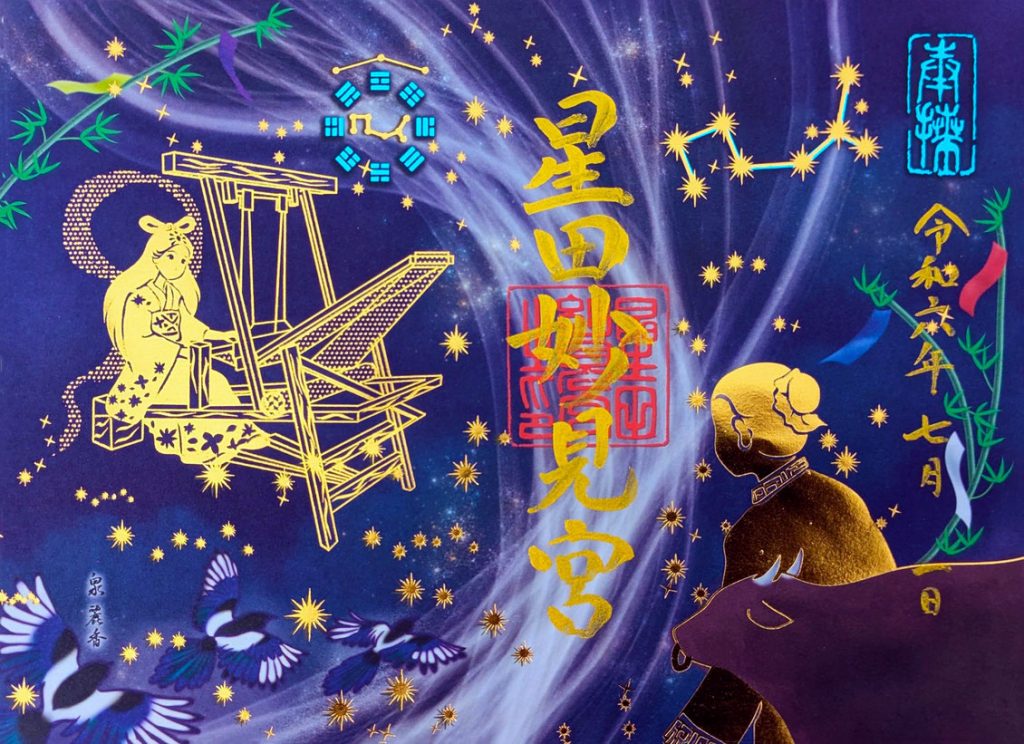
Tomorrow, July 7th, is Tanabata. Tanabata is an annual event held at the turning points of the seasons (sekku). It is counted as one of the important “Five Seasonal Festivals” along with the Peach Festival (Hinamatsuri) on March 3rd and the Boy’s Festival (Children’s Day) on May 5th. In the current solar calendar used in Japan, July 7th falls during the rainy season, and it is often cloudy or rainy, making it difficult to see the Milky Way. However, in the lunar calendar, July 7th falls in early August, when the rainy season has ended nationwide, and there is little influence from moonlight, so if it is clear, you can see the beautiful night sky with the Milky Way flowing through it.
The Tanabata currently enjoyed in Japan is said to be a combination of ancient Japanese customs and legends derived from China. The Tanabata Festival has become increasingly popular over the years, and unique Tanabata festivals are held throughout Japan.
In Osaka, the Tanabata Festival at Hoshida Myoken Shrine in Katano City is famous and is known as a power spot where a meteorite fell. It is recorded in ancient documents that a meteorite actually fell in this area in 816 AD, and the impact caused the hillside, including the basin of the waterfall called “Toryu no Taki,” to blow off and remain in the shape of a horseshoe. It is speculated that the presence of many blacksmiths and sword makers in this area is also a remnant of this event. Moreover, the area became one of the few places in Japan with Iwakura (rock seat) faith, due to the many giant rocks scattered by the meteorite fall. Within the shrine grounds, there are places like Orihimeishi and the basin of Toryu no Taki, where the connection with stars can be seen everywhere, and the design of the shrine’s stamp book also expresses legends related to stars, and the Tanabata Festival is also held there.
明日7月7日は七夕です。七夕とは、季節の節目(節句)に行われる年中行事のことです。3月3日の桃の節句(ひな祭り)や、5月5日の端午の節句(子どもの日)などと並んで、節句の中でも重要な「五節句」のひとつに数えられます。現在日本で使われている「太陽暦」だと、7月7日は曇りや雨の日が続く梅雨の時期で、天の川を見られないことも多いです。しかし、旧暦の7月7日は今の8月上旬になりますので全国的に梅雨明けしていて月明かりの影響も少なく、晴れていれば、天の川が流れるきれいな夜空を眺めることができます。
日本で現在親しまれている七夕は、日本古来の風習や中国由来の伝説が掛け合わさってできたものとされています。七夕祭りは年々盛んになり、全国各地でも特色ある七夕祭りが開催されます。
大阪では、交野市にある星田妙見宮の七夕まつりが有名で、隕石落下地点としても知られるパワースポットになっています。実際816年にこの地に隕石が落ちたことが古書に記録されていて、「登龍の滝」と呼ばれている滝壺を含め山の斜面が隕石が衝突した際の衝撃で吹っ飛び馬蹄型として残っています。この地域に鍛冶屋や刀作りが盛んだったのもその名残りだと推察されています。また、隕石落下で飛び散った巨岩が多くあり、日本でも数少ない磐座信仰の地になりました。境内には織女石や登龍の滝壺など、星との関わりが随所にみられ、御朱印帳のデザインにも星にまつわる伝説が表現されており、七夕祭りも開催されています。
